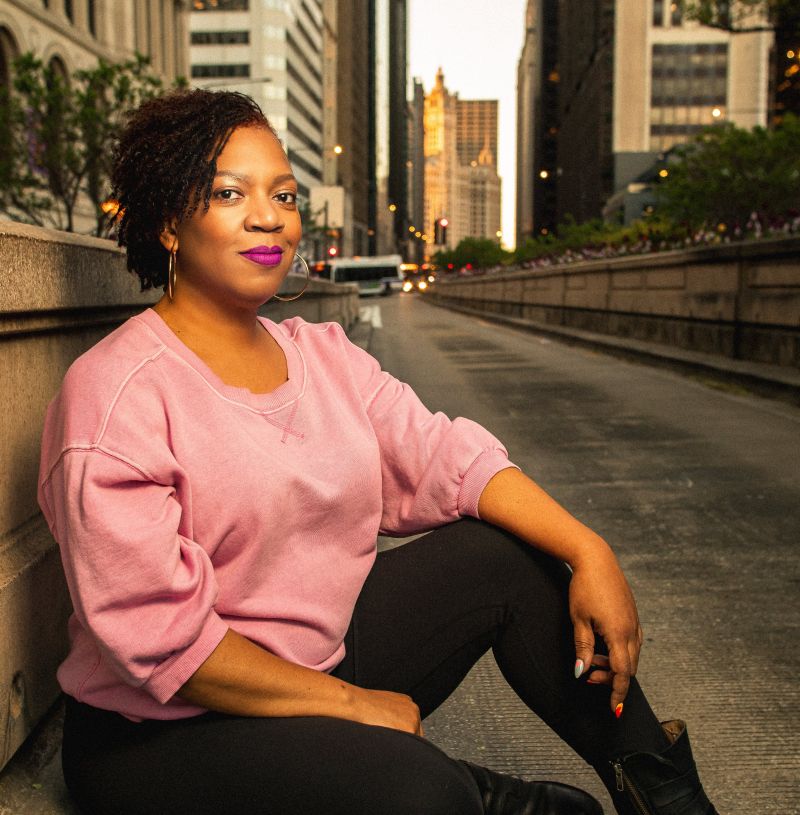
28 minute read
Turning the Lights On
An interview with Lili-Anne Brown
BY KIMBERLY SENIOR
Lili-Anne Brown and Kimberly Senior met in Chicago, where both directors forged their earliest creative paths in the heralded storefront theatre scene. When the two longtime friends and colleagues talked over Zoom for this interview, Brown, a Chicago native, had just returned home from directing a production of August Wilson’s Two Trains Running for The Acting Company. She had spent the weekend attending plays, catching up with the theatre community she loves fiercely, and was brimming with enthusiasm for performances she had seen—Andrew Burden Swanson in Ronán Noone’s The Smuggler at Jackalope, directed by Gus Menary, and Stephen Schellhardt’s production of Fun Home at Porchlight Music Theatre.
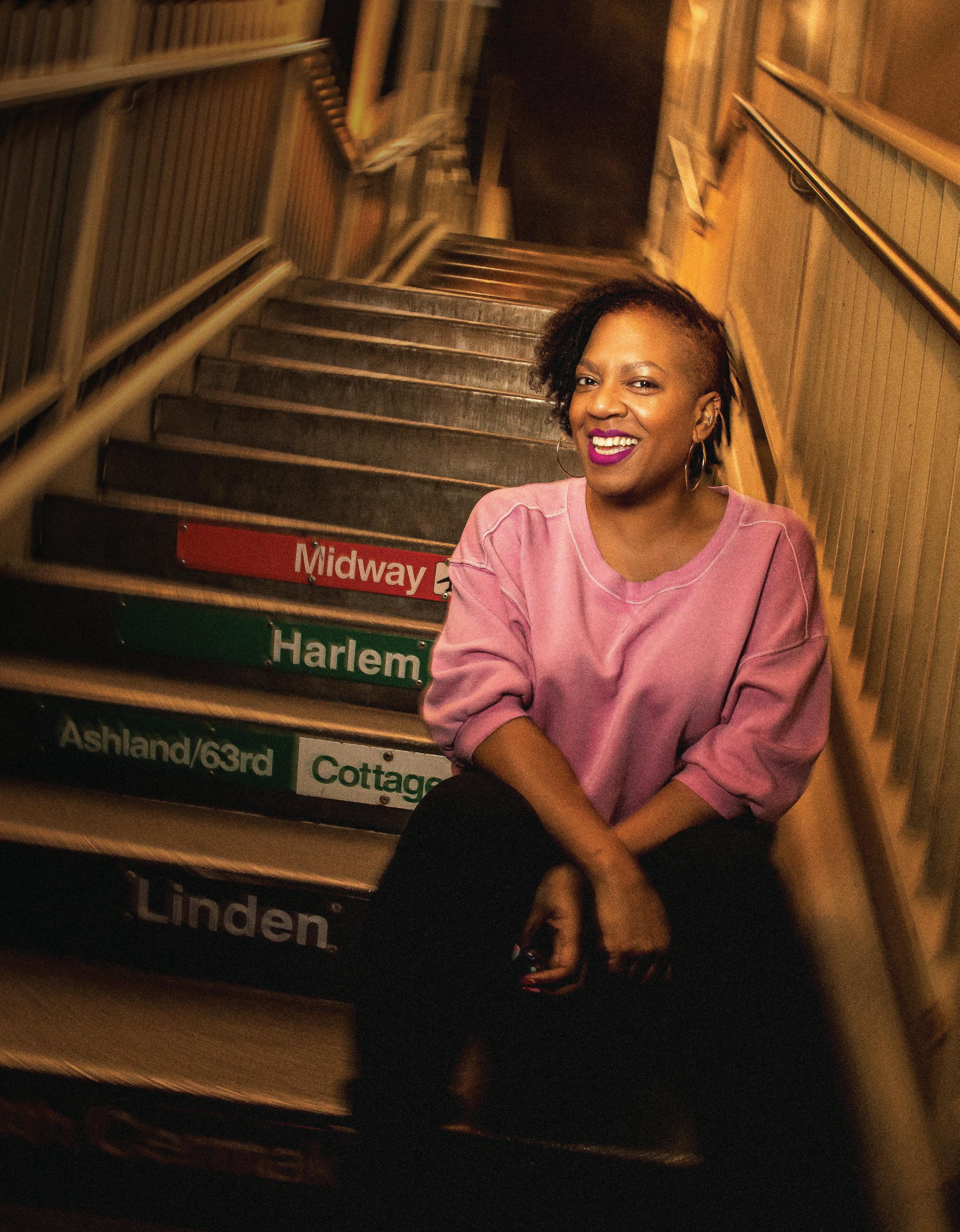
LILI-ANNE BROWN | The little girl who played Small Alison [Tessa Mae Pundsack] in Fun Home—I’m still thinking about her. When she sang “Ring of Keys,” she had true, profound discovery. The kind that you spend your whole career trying to get out of actors. Just that constant note of, ‘Don’t forget you are experiencing this for the first time. This is transformative.’
KIMBERLY SENIOR | You’re talking about these holy grail moments of performance. Tell me about your process as a director.
LILI-ANNE | I think I am just a guide in the room, because what happens in the room is magical. And what goes into the room, of course, affects what comes out of the room. I’m as painstakingly particular as I’m allowed to be about what goes into the room and the spirit of the thing. Actors need to be given everything they need. It’s not about creature comforts, although coffee and a snack are nice, too. It’s really about being supported and feeling safe.
We spent a bunch of time about a decade ago talking about “safe space,” and I feel like we didn’t get at it. That conversation was rather surface because, of course, people with money who run things want to problem solve. They’re just like, “What is this? Is there a Band-Aid available? Great. Here it is,” instead of having the deep conversation of what safety is and how to provide it. So I spend a lot of time trying to put people together who will make magic together. It’s sort of chemistry; these molecules have to bond in certain ways. And trying to make the room safe, make everything conducive to the magic happening.
KIMBERLY | So the director’s job isn’t just telling the story?
LILI-ANNE | That’s tech to me. I love tech, I can be very technical, but I do not lay claim on that magic. It is not mine. It’s greater than me. It’s always going to be greater than me. I am just trying to get out of my own way and help everybody else get out of their own way. I honestly think if you said, “Okay, if your job came down to one job, what is it?” I would say: helping people get out of their own way.
KIMBERLY | I’m having an image of a party being thrown. You’re not even throwing the party—the director isn’t throwing the party—but you’re a guest who maybe has access to bring a few more things than everybody else. “Maybe there’s a better table. We want the round table. That lighting doesn’t work.” What I love about what you’re saying is it doesn’t feel like this is Lili-Anne’s party; you’re also a guest and you’re going to experience the joy of being a guest at the party too.
LILI-ANNE | I really do.
KIMBERLY | With a little bit more concierge effort.
LILI-ANNE | Yes, one of those really good concierges that has that special key. It’s like the Wes Anderson movie, The Grand Budapest Hotel. There’s a special level of concierges that actually exists in the world that I didn’t know about until I saw that movie. I would like to be that kind of elite service provider.
KIMBERLY | You use the words “safe” and “safe space.” What do those words mean to you? Those are words that get thrown around a lot, always with positive intent, but I think there’s a really different definition for everyone.
LILI-ANNE | Exactly. That’s why I was saying that conversation that started 10 years ago hasn’t really been mined. I never really saw it being hit in the way that I wanted it to because the work is not one-size-fits-all. You know that’s one of the bees in my bonnet about the American theatre—and many other things. It’s not one-size-fits-all, and I really take that super seriously in the room. It is a hard job figuring out how to make a safe environment for 20 different people in potentially 20 different ways. That’s the work; that’s the really hard work. For me, “safe” is there are no impediments to doing the work. For an actor, that work is being vulnerable. Trying and failing every day and trying again, and trying to go deeper and revealing themselves and being willing to look a fool and just bare themselves. It is such raw work, and they have to be so brave.
KIMBERLY | In this, a safe space is one where all impediments are removed from you doing your job. Which can mean a lot of different things to a lot of different people, right?
LILI-ANNE | So many things. It could be anything.
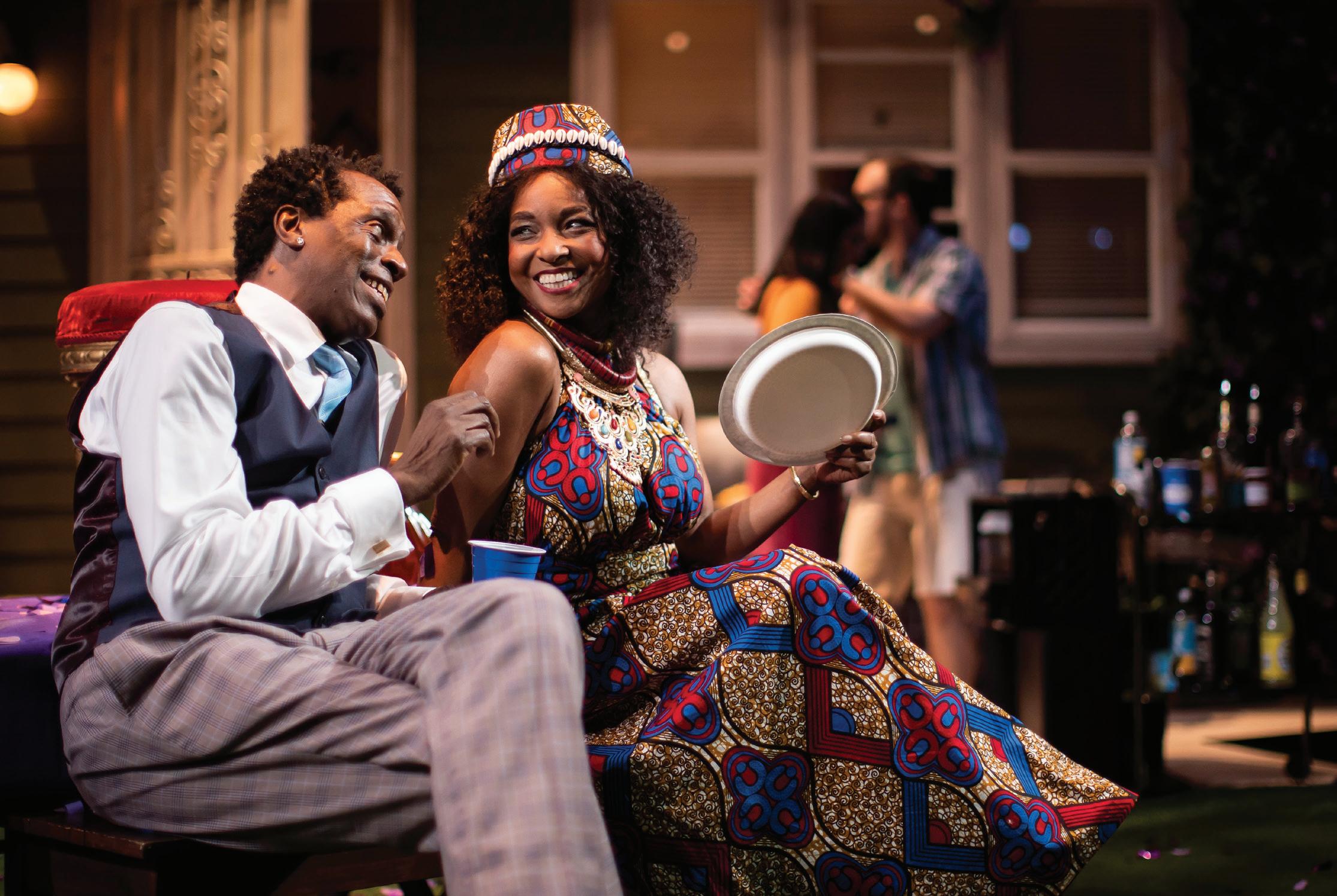
I spend a lot of time trying to put people together who will make magic together. It’s sort of chemistry; these molecules have to bond in certain ways.
KIMBERLY | An impediment could be a physical obstacle, an emotional obstacle, it could be financial. It could be all these things. So you’re there in your concierge/ party mode and you’re like, oh, this feels like an impediment. I’ve gotten to observe you in space with people, and what you’re great at is asking, “Is this in your way? What would happen if I just moved this for you?” That is where the true magic happens. I think lots of people can concierge. I think a lot of people can do those tasks. But the listening and insight and intuition that you possess help you shape these spaces so that they’re free of impediments.
LILI-ANNE | Thank you. But let’s make no mistake. It’s not like I’m totally egoless. I sort of get off on doing it well, because it feels so good to be in a space like that. I enjoy it, and I enjoy that actors, technicians, designers feel comfortable, too.
KIMBERLY | Can you think of an example of where you feel like you’ve been able to do this well?
LILI-ANNE | Almost every time.
KIMBERLY | Yes. Great. What’s your favorite thing you’ve ever made?
LILI-ANNE | Well, my favorite thing I’ve ever made—one of my favorite stories is how that cast checked me one day and I learned a ton.
KIMBERLY | Tell this story.
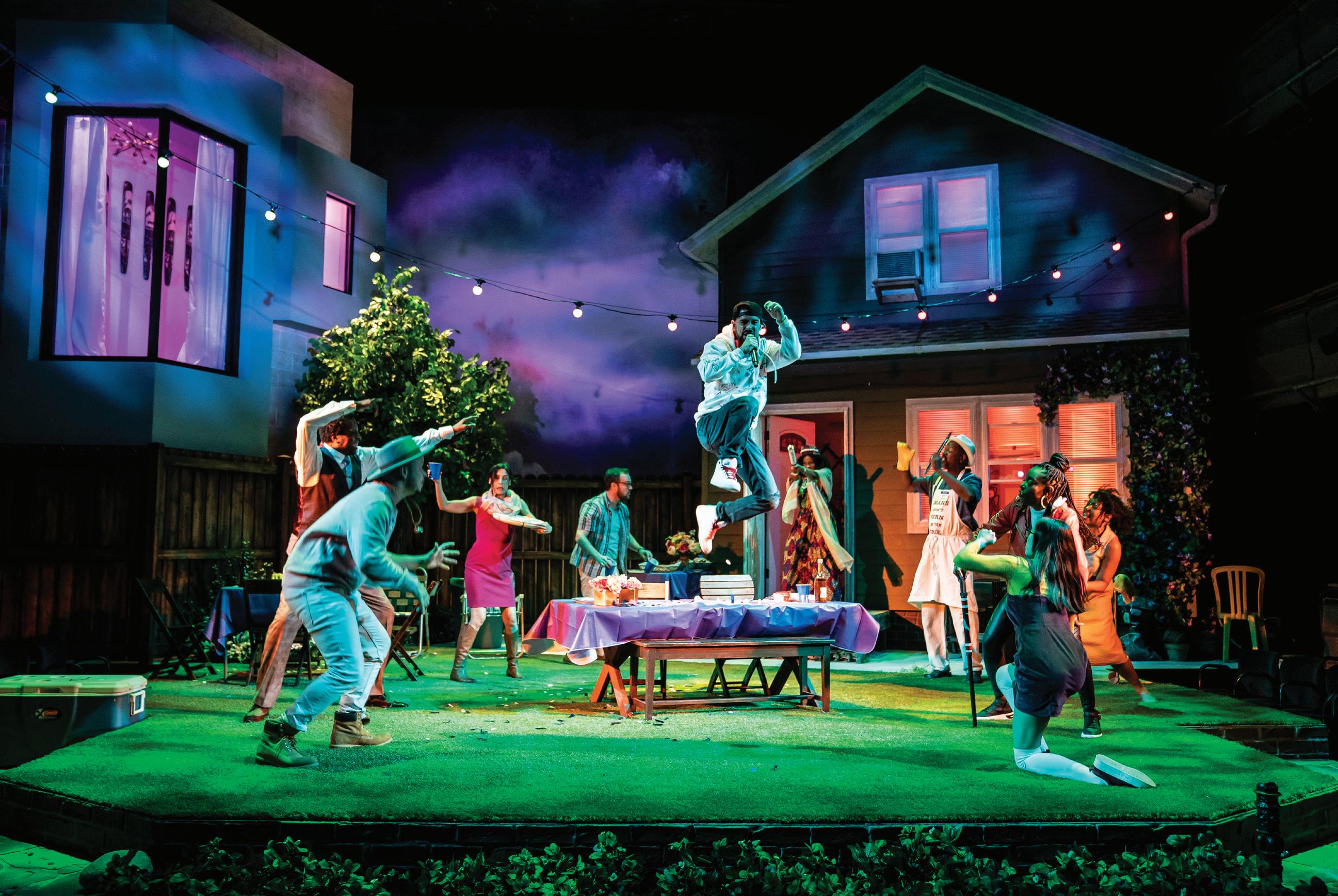
LILI-ANNE | This is formative for me. My favorite thing I’ve ever made is Lottery Day, for a bunch of reasons. [Brown directed a workshop of Lottery Day by Ike Holter at Goodman Theatre’s New Stages Festival in 2017 and the world premiere at the theatre in 2019.] It was like a theatrical equivalent of Avengers: Endgame. Nothing else exists like it; it is the final play of a seven-play saga that takes characters from each of the previous six plays and puts them all in one play. We actually used the actors that had been in those plays. So it wasn’t just the characters, it was also the actors that originated the characters.
KIMBERLY | How many of those other plays leading up to this big finale were you involved with?
LILI-ANNE | I had only been involved in one of the other plays and I didn’t premiere it.
KIMBERLY | That’s cool, though. So many times we hear stories where everyone’s like, “I was with it from before Ike was born, I was already putting the idea in his head.”
LILI-ANNE | What’s great is how we do community here in Chicago. I feel like I was part of the world from the first play because Ike and I are friends and mutual admirers; I was seeing his work, and he was seeing my work. I saw all the plays and had a lot to say about them, and we would talk about them and think about them.
The plays really respect and love Chicago, and there’s an athleticism and authenticity of the language and how people speak to each other while also being heightened language. Ike is often compared to August Wilson, which is generally lazy. For me, the only reason for any comparison is that both write authentically the way people talk, but are presenting it in a way that is heightened. That hat trick is so special. It’s one of the many reasons I love his work.
The most special thing about Lottery Day was that the community was so excited about it. When do you get that—an entire theatre community in a big city like Chicago all rooting for one little play? That started in 2017 when we were in workshop. I think we were the first New Stages show to ever sell out in a matter of hours. I think Goodman was like, “What’s going on here?” But the whole thing was that we were the Bad News Bears. We were considered the scraggly storefront kids who would never ever be setting foot in the Goodman. Then here we were, going to set foot in the Goodman—
KIMBERLY | A lot of feet.
LILI-ANNE | When we were in New Stages, it felt like incredibly high stakes, and I think Ike felt that too. We had all these conversations where we were like, “We are going to kill this. It’s going to be amazing. This staged reading in this festival is going to be the biggest, best, awesomest workshop that they’ve ever seen because we are determined to get produced.” It was as if we thought there was something that we personally could do, right? If we ran real fast, we could win somehow and get a production. That’s really how we were approaching it, with just insane stakes on it. And at one point that really got to me.
The wonderful Tanya Palmer—it’s just very funny to even say it was Tanya Palmer in this story because we both know how lovely Tanya Palmer is, right? [Palmer was Goodman’s Producer and Director of New Play Development at the time, in which capacity she coordinated the annual New Stages Festival ] She’s the best, most supportive—
KIMBERLY | No bigger champion of new plays and artists.
LILI-ANNE | That workshop process, more than any process I have ever been in—and this is saying a lot because my room tends to be a party—but that room was literally a party. Every day we would throw a party and see where the chips fell, and that helped Ike write this party in the play. So it was real rowdy, and we were hyper aware of where we were and who we were in this place. And I have to say, we were a room full of Black and Brown people. One day we’re doing something, and Tanya comes in to observe, unannounced. She just wandered through. I was like, “Oh God, the literary manager is here. All right, everybody, let’s go back to one and then we’re going to run this again.”
And the cast was like, “We’re going to do it eventually.” But in their own time and while being loud and still telling jokes and doing whatever the hell they were doing. I immediately thought, “Oh God, she’s going to think that I don’t have control of the room.” I got real in my head about it. And later, when she left and we were done with our work, I said, “So you guys, when these Goodman people come in here—”
KIMBERLY | We’ve got to behave.
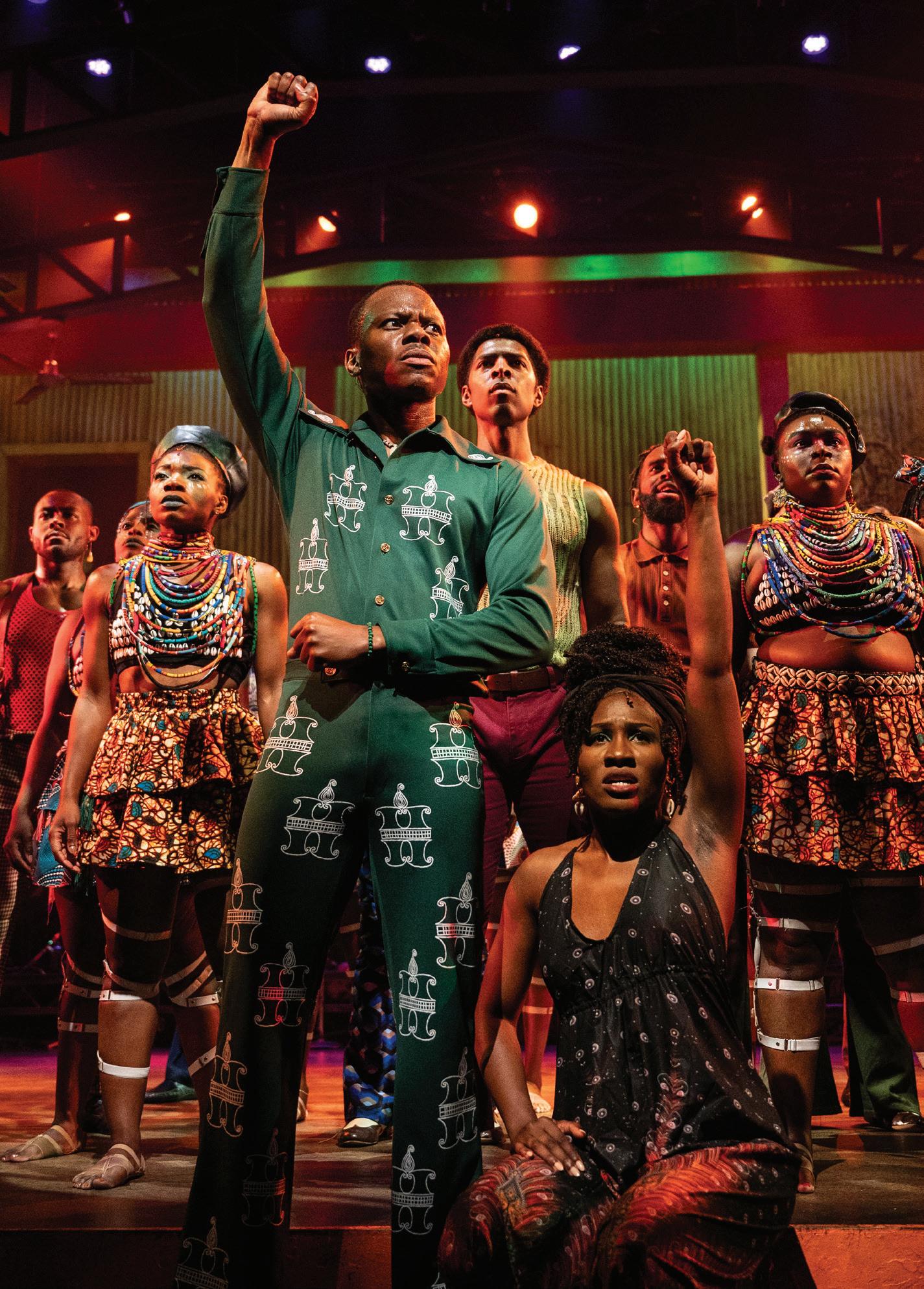
I still feel like a storefront director. I don’t know how to feel any differently.
LILI-ANNE | “I need you guys to listen to me. I’m going to get replaced by some other director if they think I can’t run my room.” I genuinely thought, this play will maybe get produced, but they won’t let me direct it.
And of course it’s sort of an unstated thing—especially because of who was on the staff at that time—I might be saying “these Goodman people,” but it’s also saying, “these white people.” So I said that, and God bless them, it was like a record scratch moment. They just looked at me, like, she said what? And they said, “Oh no, no. First of all, you are the one that told us that we are not doing that. You created this culture. You created this room. You told us to be free. You made it safe for us. You did this. And now we’re being ourselves and having the time of our lives and what we’re not about to do...” They kind of were like, “How dare you say that, Lil, we are very disappointed.” And I was like, “Holy shit, you are so right.”
KIMBERLY | I love that they were holding a mirror up to you; they were saying to you, “Be more you.” You had created such an amazing thing that the cast was able to uphold your values even in a moment where you crumbled a little. This is what we do, and this is who we are.
That story is very foundational about you. Knowing you, I see how a lot tracks back to that minute. This is why I think you’re one of the greatest minds of the American theatre. From experiences like this, you’re like, “I know how to fix things. I’m not going to stand on the sidelines and point. I’m not going to write essays. I’m barely going to complain, except maybe after a couple of cocktails with close friends. But what I’m going to do is model this behavior.”
LILI-ANNE | It was super formative, and also one of my greatest success stories. I created something where the actors felt so comfortable that they could say to me, the director, you’re fucking up, in a way that was perfect and loving. I think about that moment and I’m so grateful because I consider it an incredible success to create a culture that does that.
KIMBERLY | It’s very easy for us to use words like “party,” and “concierge,” and “creating culture,” and “empowering people,” and “removing impediments.” All of which are true and all of which are the things that you do. But the people we’re working with, that we love and are our collaborators, have been held down, disenfranchised, and disempowered, and their predominantly Black and Brown bodies have not been seen and acknowledged. So there’s some work to do in there.
I don’t want someone to read this and be, “Okay, cool. What I have to do is throw a party and act how I want to act.” I want to ask you about the challenges of doing the work and the creation of culture that you’re doing, and what happens if and when it backfires?
LILI-ANNE | If and when it backfires. First of all, it’s heartbreaking. I feel like I have a lot of what I would count as personal successes and not a lot of personal failures. But I do have them, and they haunt me because I try to learn and sometimes there’s not anything to learn. Sometimes you can’t remove impediments from people because sometimes they’re internal and I can’t remove that. I can sure try. And that can be heartbreaking, especially if there’s not any awareness.
Also, as a director, you have to be ready to fall on your sword, to take the blame, because you might be blamed for not being able to remove somebody’s personal impediment. Because they’re looking around like, “Everybody else is having a great time, why am I not? You’re not taking care of me.” That has absolutely happened.
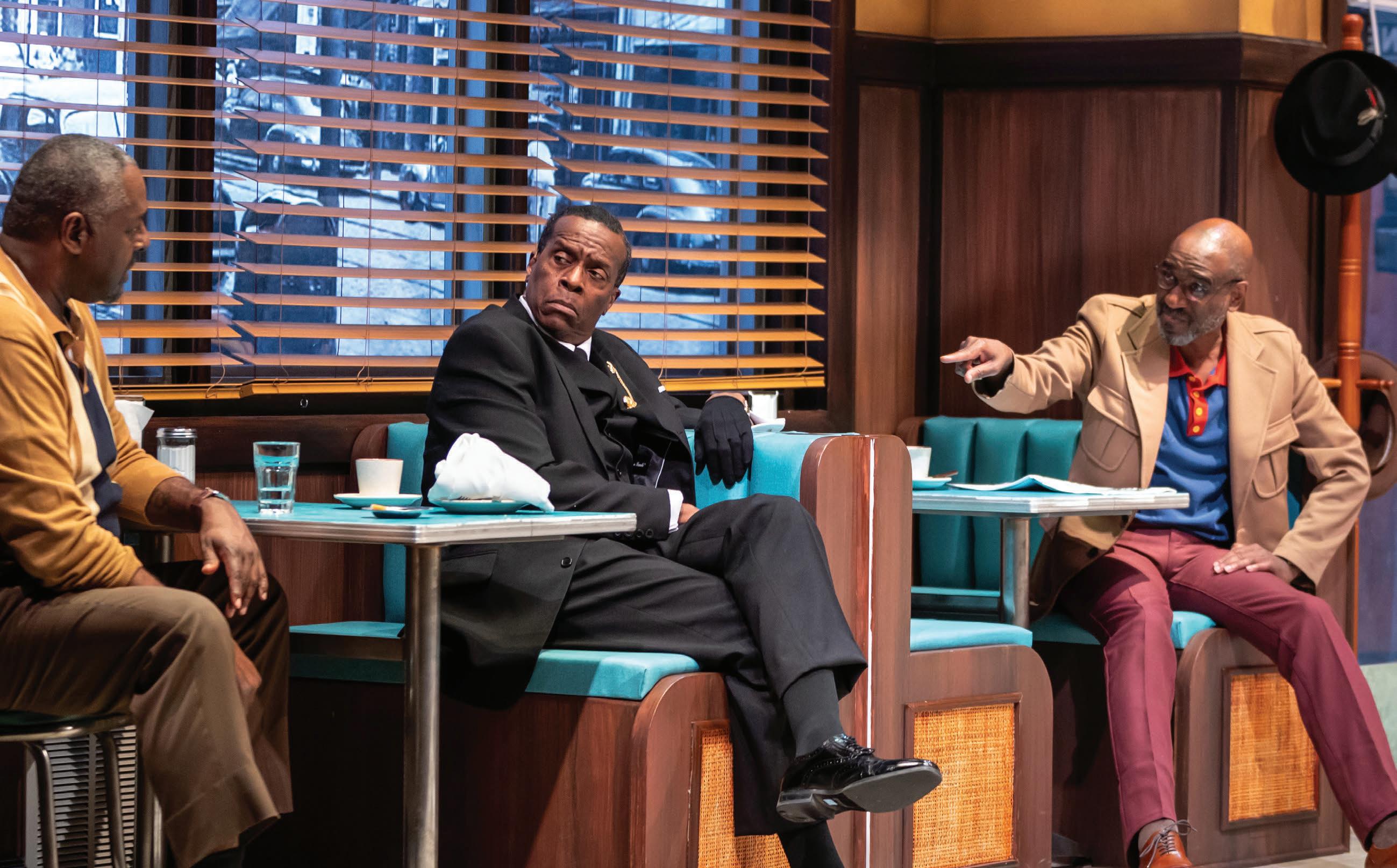
KIMBERLY | On the list of what makes you a great leader is your ability to also be vulnerable and admit that you’re a human in space. I think women of our generation, in particular Brown and Black women, we were told, “Don’t show a thing.” “Be a rock.” “Don’t let them see a crack.” “Don’t let them see you sweat.” I feel like some of your superpower lies in what you’ve been talking about. This vulnerability, and ability to take stuff on or to know you can't take this on, is part of the humanity and the redefining of leadership that I think you do really well.
LILI-ANNE | I want to be down on the ground with the actors.
KIMBERLY | Well, you’re an actor.
LILI-ANNE | I’m always telling them, “I’m in here with you.” But they don’t necessarily feel that way. I really used to be like, “I’m down here in the mud with you,” and they believed it. The more my career goes along, the older I get, the further away—
KIMBERLY | Let’s also admit, the fancier you get.
LILI-ANNE | Right, fancy. Whatever that is.
KIMBERLY | When you’re making plays for $12 with 10 clip lights above a Mexican restaurant, you can roll on the ground with the people.
LILI-ANNE | Right. And they feel that because they see you painting the set.
I still feel like a storefront director. I don’t know how to feel any differently. I’m just, “Yeah, we’re all going to go have some beers and paint the set.” And everybody’s looking at me like, “What are you talking about?”
KIMBERLY | You said it so perfectly; you’re still in the storefront.
LILI-ANNE | I am. I will never not be. I just am always going to be like, “Well, you know what? Can we just take a PVC pipe and paint it up and then that can do it?”
KIMBERLY | “I’ve got some tinfoil in my trunk, and I think it will do the job.”
LILI-ANNE | I’m very blessed. I also think I worked hard for it, and, lucky me, I accidentally branded myself well. My trials and tribulations became my strongest suit because I could not get hired as a director 20 years ago, especially as a Black girl who wanted to direct musicals. Everybody was like, “Huh, no, what are you talking about?”
Because of that, I had to self-produce all my first work as a director in Chicago. I had been here as an actor the whole time, but as a director—for the first few years I just self-produced. If I’m producing it and I’m programming it, I’m going to do all my bucket-list stuff that has been sitting in my heart for years. I wasn’t thinking about branding. I was just thinking, “God, I really want to do Dessa Rose. I want this story to be told. I really want to do Marie Christine or See What I Wanna See. How come Bloody Bloody Andrew Jackson has never been seen in Chicago? I have to do Passing Strange.” I was just bursting, and inadvertently, that became my brand. People were like, “Wow, we have a strong sense of what she does.”
By the time I was entering the LORT world, the brand was really, really strong because all I had done previously was artsy musicals and new work like Lottery Day and Ike Holter’s Wolf at the End of the Block, and Kristiana Colón’s Tilikum. And so people had a really strong sense of what I was into, but all of that was born of nobody letting me do Mamma Mia!
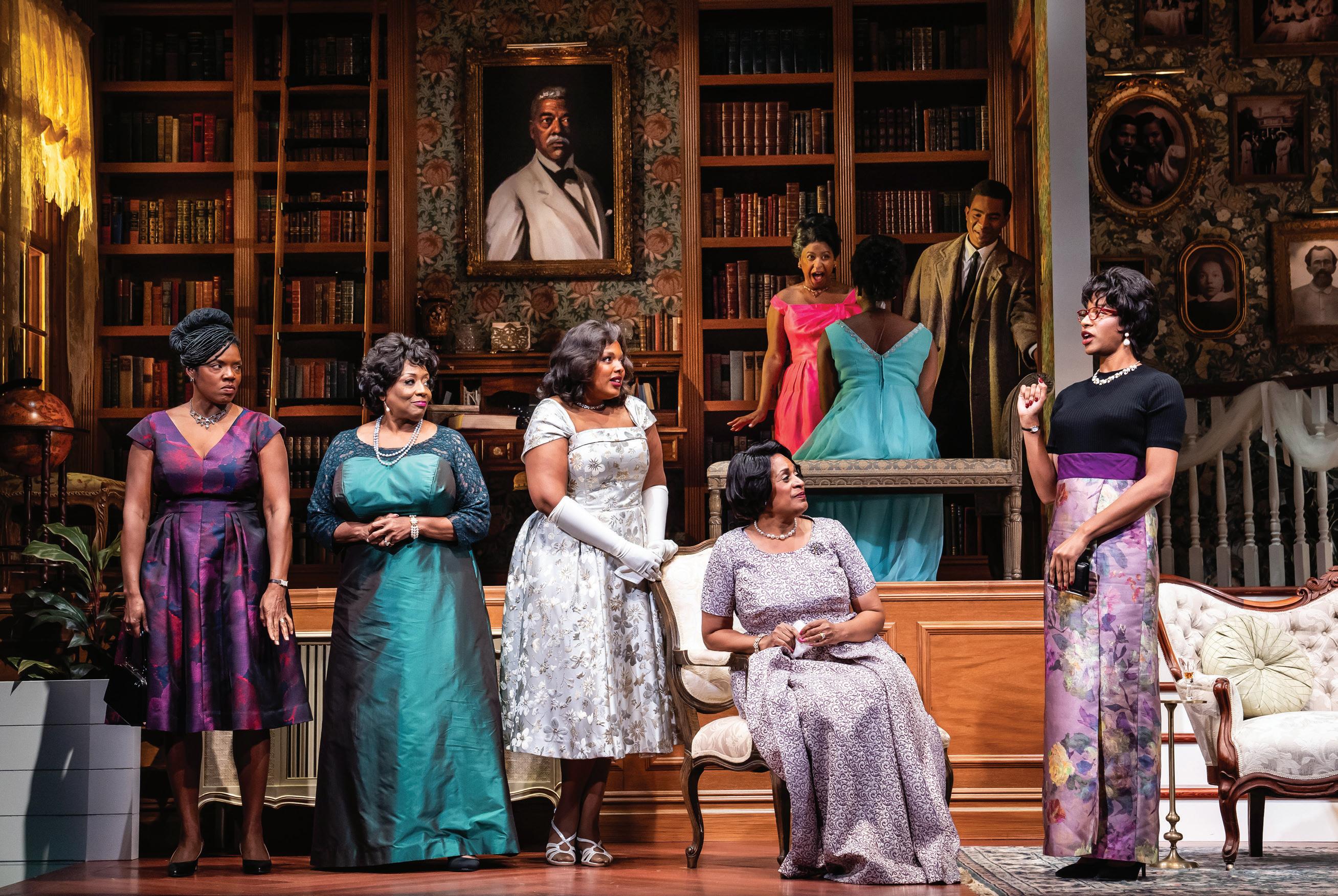
KIMBERLY | I wouldn’t mind seeing your Mamma Mia!, but...
LILI-ANNE | When you’re like, “Will anyone let me direct anything?” “What are you doing? Can I do it?” and the answer being “no” for years and years and years, that created something wonderful eventually. But thank God I didn’t give up, because that’s another thing that sometimes happens.
KIMBERLY | Well, we are all very lucky.
LILI-ANNE | There was no way, there was no way I was giving up. I had just tried for too long. When you’re called to do a thing in the way that I know we both feel called, there is no alternative.
KIMBERLY | Let’s talk a bit more about Chicago. You used the word community a lot when you were talking about the Lottery Day story. I’d love to start with your definition of community, or what you feel community is, and how much of that comes from your lifelong experience in Chicago.
LILI-ANNE | As [Chicago historian] Dilla says, “Everything dope about America comes from Chicago.” I’m from the South Side, so I was born into a strong community. I’ve always felt sorry for anyone that didn’t come from some sort of formative big community.
I think we’re getting separated from some of our humanity as communities dilute and dissipate in this modern, isolated world. Theatre is one of the most communal things that humans do. Period. There’s eating together and theatre. I’m like, these are the top two, you guys—things that you can do together that are spiritual and necessary and there’s an agreement. That’s how I feel about theatre.
When people come to Chicago for a show, I always feel really proud when they start talking to me about this community. “You just support each other and everybody knows everybody, and everybody knows what’s going on. It’s so close-knit, and it feels less competitive and more supportive.” I really believe all of those things. That is what I come from. I think there have been a couple Golden Ages of Chicago theatre. I wish we had names for these eras.
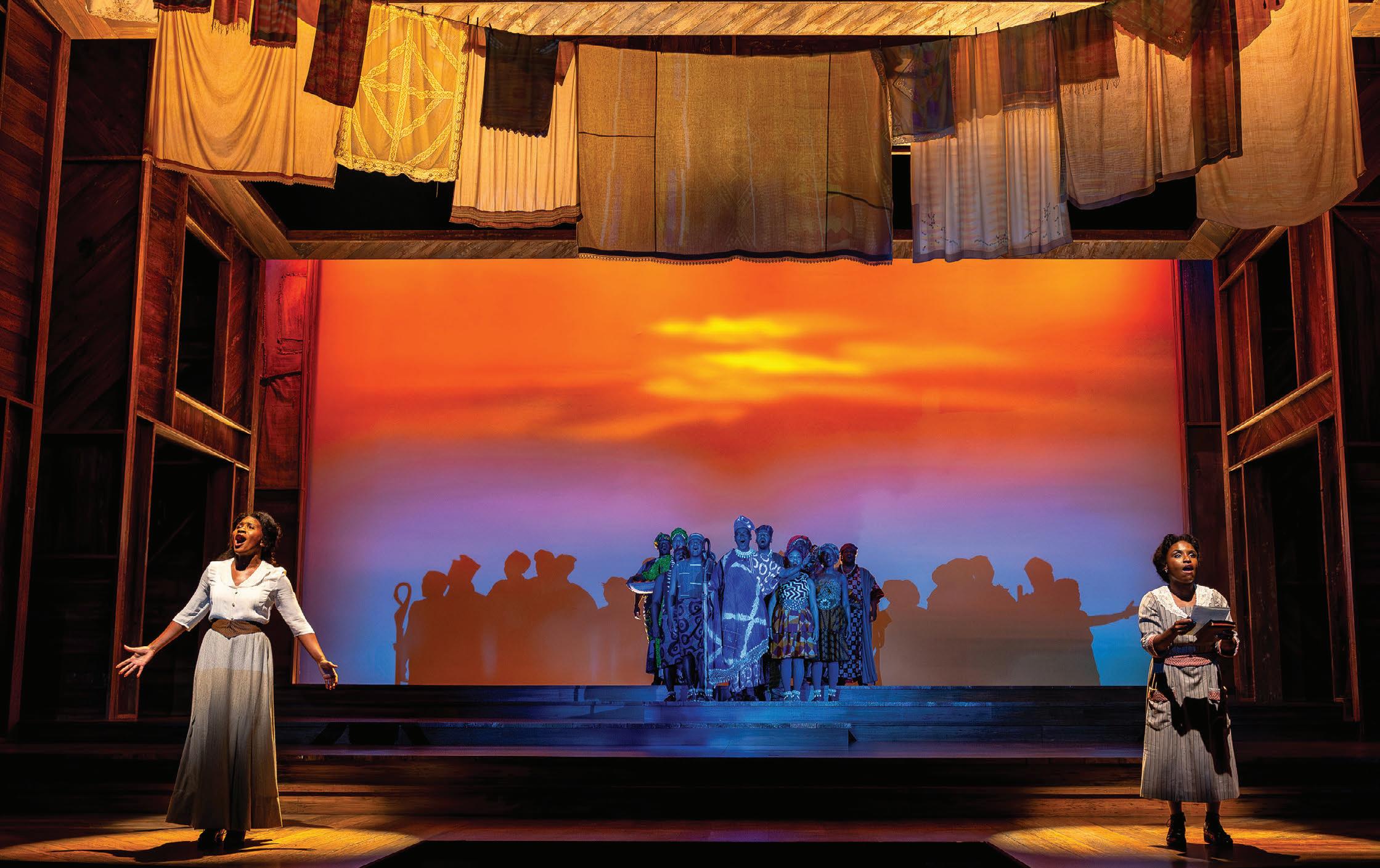
There was no way I was giving up. I had just tried for too long. When you’re called to do a thing in the way that I know we both feel called, there is no alternative.
KIMBERLY | Like they do for generations.
LILI-ANNE | Whatever era is 1990 to 2020, that 30-year period for me was distinct in Chicago theatre, especially in storefront. There was the House and the Hypocrites.
KIMBERLY SENIOR | Bailiwick Chicago.
LILI-ANNE | Jackalope came to be. My theatre company, Bailiwick Chicago, came and went. A lot of theatre companies came and went. We had Oracle, we had the changeover and then death of ATC [American Theatre Company]. I could go on, right?
KIMBERLY | I moved to Chicago in ’95, and thought, “There’s 150 theatre companies here at any given time.” How many companies have I seen come and go, and now there are new ones that I’m so psyched about. Even with the ever-changing nature of the landscape, the soil is fertile.
LILI-ANNE | I think of that era as being so influential. Martha [Lavey, of Steppenwolf], Bob [Falls, of Goodman Theatre], Barbara [Gaines, of Chicago Shakespeare Theater]. Those were the titans I was looking at. And then I think about the small companies that were coming up. These kids are in a fucking house all living together on Honore with this stage in the backyard that is maybe going to fall down at any given moment. Which is also part of how I met Ike Holter. I remember that the first time I went to the Inconvenience [a community of interdisciplinary artists, where Holter is a member], I left 10 minutes later because I was like, “Who are these kids?”
KIMBERLY | They’re younger than we are.
LILI-ANNE | I’m not cool. I felt really weird and out of place, and he kept inviting me. He didn’t care that I just was a dork. This is what I’m talking about with community. I had come in as a musical theatre person, and I will say the community can be extremely segregated—but it’s not on purpose. Everybody thinks their world is the world because theatre is your life.
If you’re doing musicals, first of all, you spend most of your life commuting. At least in my era as an actor, all the large-scale musical theatre was out in the suburbs, which is why those of us at Bailiwick Chicago and these other companies were trying to bring musical theatre to the city. We thought it was crazy that everything was Mamma Mia! or Oliver! We were like, “But I want to see some dark thing that Michael John LaChiusa wrote.” There were dozens of musicals that had never been to Chicago. It was as if, if there wasn’t a Broadway tour, they weren’t worth doing.
This could be where we start segueing into talking about commercial theatre versus non, because I’ve been thinking about and talking about that a lot lately. I had to check in yesterday with the Walder Foundation, it was the one-year mark of my award.

KIMBERLY | You were an inaugural recipient of the Walder Foundation’s Platform Awards, a three-year grant that provides unrestricted support for performing artists working across disciplines in Chicago. I love that the money is distributed over a period of time, because it acknowledges the burden of the hustle. It’s a bridge so that you can be the artist that you are without biting your fingernails each month to make sure ends meet.
LILI-ANNE | The Foundation keeps asking me, “What resources can we provide?” And I keep responding, “I want you to introduce me to the money people.”
This is something that I’ve been asking everywhere. It’s my new question everywhere I go. “Can I meet the money people?” Because especially in Chicago, I don’t understand why we are following a format given to us from another city, from New York, when we should be figuring it out for ourselves and doing our own thing.
There are all these big theatres where shows come in—they are not generated here—and the producers spend all this money and the money leaves Chicago. We don’t get the money. This is taking up all of our real estate downtown. We don’t own most of those venues. Our actors aren’t in those shows, for the most part. All of the talent is imported. The shows are imported. And then the money is exported. How is this for us? What do we get?
KIMBERLY | I think you’re answering the question I was about to have, which is, why aren’t we making our own commercial theatre that’s nurturing and feeding our community here?
LILI-ANNE | It frustrates me that people keep writing think pieces about, “Is the theatre dying?” Nobody’s actually asking the artists what’s wrong and how to fix it. Because what is wrong with the American theatre right now is that the artists have taken a far back seat. We’re in the trunk. We don’t lead the art anymore, unfortunately.
KIMBERLY | That leads me to, what do you want to dream into being?
LILI-ANNE | I have been to several theatre shops, and some of those shops are on the South Side of Chicago, but few Black people work in those shops. The people in the community that the shop is in don’t work in the shop. I think these people don’t know that these are jobs—they have never heard of a scenic charge; they’ve never heard of IATSE. That bothers me, particularly because I know people who have certifications in welding or work in construction. Can you imagine somebody pouring concrete day to day, how it would change their world if they were building a set? How would it affect them, how would it open up their world?
To create some sort of pipeline, to expose people to those jobs, is something that I want very much.
I also want to create commercial pipelines, because “commercial” should not be a dirty word. The way things are set up now, it kind of is. As we’re dealing with late-stage capitalism and a rising oligarchy, commercialism does feel dirty. But it doesn’t have to be.
I’ve had conversations where board members have asked, “Why are you doing it that way?” And I’ve replied, “Because that’s best practices for making a play.” Sometimes it makes them uptight because it’s a thing they don’t know about, as opposed to allowing themselves to be led through the world and saying, “Tell us what you need and let us meet you in the middle and work out how we can facilitate that.” It’s sort of like when someone gives you a present and it’s something you didn’t ask for and don’t want. But if you don’t like it, suddenly you’re an ingrate.
KIMBERLY | What you’re saying is, if we’re transparent, if we just turn on the lights a little bit, everybody would be functioning better. The stumbling blindness and the walls we’ve built are the impediments—back to that—to all of us thriving. This is working for you at an artistic level, at an organizational level, at a dreaming level. You’re like, “Let’s just turn the lights on, y’all.”
LILI-ANNE | Transparency on all levels would do so much for us; I really think it is the answer. And I understand that you can’t do everything democratically. That is not what I’m suggesting.
KIMBERLY | That’s not what you’re saying.
LILI-ANNE | I’m suggesting transparency, and I am suggesting that things be artist-centered. Not optics, because these days everything is optics and most of what we see is not what’s really happening. Which is also how a lot of the kids are getting miseducated, which is a huge problem right now—especially for the kids that came into this industry in the midst of and in the wake of a pandemic, to really not understand how the sausage is made. If the people who are paying for the sausage don’t know how the sausage is made and the people who are eating the sausage don’t know how the sausage is made, and half of the people in the factory making the sausage only know about the one lever they pull, we’ve got a real problem.
KIMBERLY | That’s how power has worked. If I leave you all in the dark in your little silos, you can’t join together and try to overtake me. And you’re like, why would I be threatened by all these amazing people that are working together to make this thing? You’re not saying, “Oh, let’s be democratic all the time.” You’re saying, “I’m going to make the decision. I just want to tell you why I made it, and I want you to know that you were thought of and considered.”
LILI-ANNE | To go back to the room—I spend a lot of time in my rooms asking everybody else what they want to do and what they need. Because guess what? I’m not in the play. I say that a lot. “You’re in the play, so you tell me what you need to do. Do we need to run it again? Do you have questions? Do you want to sit down? Do y’all want to go home for day and work on your lines?” We don’t have to be in here just because we have the space and have the hours.
I radically believe in asking people, “What actually is it that you need so that you can do your job?” Because I did mine. Now we’re in the room, this is just fun for me. I’m just helping people get out of their own way, until we get to tech, and I have to work real hard again.
KIMBERLY | I’m so glad we’re friends. Y’all reading this article, just be jealous. It’s actually as great as it sounds to be Lili-Anne Brown’s friend. But also she likes people, so she’ll probably be your friend.
LILI-ANNE | That’s true. But we do have fun, and it’s not that hard. You don’t have to make it hard. Whatever it is that you believe in—God, a higher power—comes into the room. And the more you can work with that, give it up to that, be in that flow, the more you win it. Because we all do that, right? If we are in that space and then we invite the audience to be in that space with us, we’re all connected. We’re all in the midst of something greater than us that holds us all together. And that’s the goal. That’s the goal of theatre.
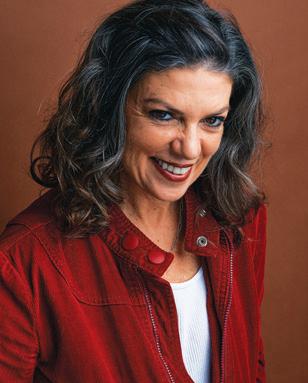
Kimberly Senior is a freelance director, educator, mentor, mother, and advocate. She is the author of What Would a Person Do? Thoughts on Directing and Living.


